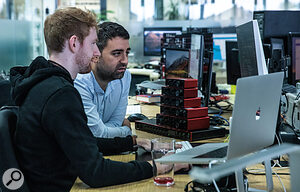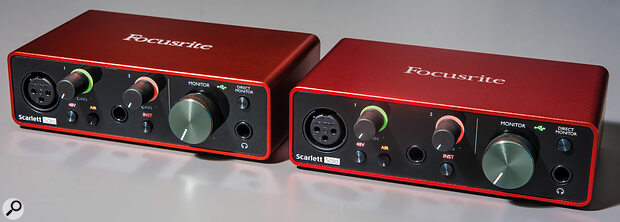 Andy Land is Head of Sustainability at Focusrite Group.
Andy Land is Head of Sustainability at Focusrite Group.
One of the audio industry’s largest manufacturing groups is taking the lead in tackling green issues.
“It may seem insignificant to spend time working out the footprint of a surface‑mount resistor,” admits Andy Land. “But without doing the legwork, you can’t combine this with sales data and say quantitively whether or not it’s an area of concern.”
At the time of writing, Andy is a year into his role as Head of Sustainability at Focusrite Group, encompassing brands such as Focusrite, ADAM Audio, Martin Audio, Novation and Sequential. The position was created partly in response to internal employee pressure, and partly to anticipate sustainability requirements that will soon be mandatory for large companies. It’s a challenge not only because the job is important and expectations are high, but because it’s so new.
Getting The Message Across
At first, quite a bit of Andy’s time was spent communicating with other staff. Focusrite is an organisation with several hundred employees, and the sustainability agenda affects all of them to a greater or lesser extent. Happily, awareness of and concern for environmental issues was already high within the company. “Getting people onboard was one of the first things, but it’s a pretty easy sell here,” Andy says. “I’ve made repeated company presentations, even up to CEO level and the PLC Board, to reassure people I’m not a ceremonial role and ensure that I have the mandate to proceed.”
Andy is well aware that the sort of change the industry needs is only possible through a co-operative team effort. In a sense, his function is to be a catalyst for wider organisational change, rather than a lone voice telling others what to do. To this end, he’s begun two related initiatives. One is to ensure that sustainability is embedded into job descriptions and company processes, so that ‘key stakeholders’ in different departments now have a formal duty to consider sustainability when making decisions. The other has been to beef up Focusrite’s existing ‘green team’; previously a volunteer‑led staff group, this is now an official organisation within the company, with appointed members and clear responsibilities.
Slippery Scopes
As a publicly listed company, Focusrite don’t only have a responsibility to the planet. They also have duties to shareholders, one of which is to anticipate any risks to their business posed by climate change and other environmental issues. The company’s latest annual report thus includes a Materiality Assessment as part of their commitment to meeting Environmental, Social and Governance standards. This, says Andy, confirms that climate change and greenhouse gas emissions are real issues for Focusrite, with the potential to harm the business in the medium and long term.
Governments around the world are starting to enforce compliance with sustainability frameworks, and the UK government is no exception. From April 6th this year, for example, a range of conditions based around employee numbers and turnover will see many UK‑registered companies (typically those with more than 500 staff or a turnover greater than £500 million) required to state climate‑related risks and opportunities in line with the recommendations of the Task Force on Climate‑related Financial Disclosures (TCFD). Large companies are also expected to audit and report greenhouse gas emissions within three ‘scopes’ defined by the Greenhouse Gas Protocol.
Scope 1 covers greenhouse gases released directly through a company’s own activity. This includes, for example, any carbon dioxide emitted by on‑site power plants and petrol or diesel vehicles owned by the company. Needless to say, some types of business have a much heavier Scope 1 footprint than others. Airlines and haulage businesses, for example, typically have very high Scope 1 emissions, whereas financial institutions or online businesses might not. It’s also fairly easy for some companies to place Scope 1 emissions at arm’s length, for example by outsourcing logistics to a third party. This makes the emissions someone else’s responsibility, but doesn’t necessarily do anything to reduce them.
The GHGP also classes indirect emissions in two further ‘scopes’. Scope 2 emissions are those incurred in the generation of any electricity, heat or steam that is purchased by a company. As such, these should be reasonably straightforward to audit, at least on paper; most companies have only one supplier of electricity in each region where they operate, and a clear idea of how much they use. However, auditing Scope 2 emissions is one thing: reducing them, which is of course the ultimate goal, is another. “Sourcing renewable energy around the globe can be tricky,” says Andy. “Some regions just have no renewable energy sources you can exclusively purchase.” All Focusrite Group operations in Europe have already been switched to renewable energy where possible.
Andy Land: "Net zero assumes all opportunities to reduce emissions with available technology have been carried out, and remaining emissions have been offset. A rough guide is that this means about 90 percent reduction and 10 percent offset."
Next Level
The real jump in complexity when it comes to auditing and controlling emissions is encountered with Scope 3. This covers emissions that happen in the manufacture of goods and services bought from suppliers, as well as business travel, employee commuting, waste disposal, logistics and distribution, and emissions relating to leased assets, franchises and investments. Importantly, it also requires analysis of the emissions that will be incurred by products once they’ve been sold to consumers — in the case of a company like Focusrite, this typically relates to their energy consumption.
 Designing and manufacturing a high‑volume product such as the Focusrite Scarlett range is a complex undertaking, and Andy Land’s aim is to embed sustainability as a goal at every stage.
Designing and manufacturing a high‑volume product such as the Focusrite Scarlett range is a complex undertaking, and Andy Land’s aim is to embed sustainability as a goal at every stage. At present, reporting is only mandatory for Scope 1 and 2 emissions, and this can be misleading. For example, oil companies can theoretically claim low Scope 1 and 2 emissions, because the impact of their product falls into Scope 3. Focusrite already audit and report Scope 1 and 2 emissions, and would like to do so for Scope 3; this, however, is much more difficult, so Andy has been trying to find suitable external consultancies he can work with “to verify our approach and help get us reporting to the mandatory levels that are on the way for a company our size.” His ultimate aim is that the company should be “looking proactively at what’s coming, rather than just reactively reporting. TCFD is a big one on the way in the 2023 financial year, but we’re aiming to report a year early now.”
At present, reporting is only mandatory for Scope 1 and 2 emissions, and this can be misleading. For example, oil companies can theoretically claim low Scope 1 and 2 emissions, because the impact of their product falls into Scope 3. Focusrite already audit and report Scope 1 and 2 emissions, and would like to do so for Scope 3; this, however, is much more difficult, so Andy has been trying to find suitable external consultancies he can work with “to verify our approach and help get us reporting to the mandatory levels that are on the way for a company our size.” His ultimate aim is that the company should be “looking proactively at what’s coming, rather than just reactively reporting. TCFD is a big one on the way in the 2023 financial year, but we’re aiming to report a year early now.”
The stated long‑term goal of the UK government, and many others, is ‘net zero’. This is often confused with being ‘carbon neutral’, but as Andy explains, there is a crucial difference. “Carbon neutral is when a product or company has offset carbon to make the total amount of emissions zero from a process. This could be done quickly by purchasing offsets. Net zero assumes all opportunities to reduce emissions with available technology have been carried out, and remaining emissions have been offset. A rough guide is that this means about 90 percent reduction and 10 percent offset. Net zero is obviously much harder, but is clearly what we need to be aiming for. Carbon neutral also doesn’t account for additional impacts — for instance, if you chop down a forest, capturing the emissions clearly doesn’t do anything about biodiversity loss.”
Here Comes The Offsetter
Carbon offsetting on a large scale usually needs to be done in partnership, whereby a company such as Focusrite will fund projects that capture carbon or reduce carbon emissions elsewhere. A major part of Andy’s role has been setting these partnerships up. “We’re looking for durable projects with social benefits for added benefit towards UN sustainable development goals,” he explains.
“We’ve been purchasing offsets for two purposes so far: air freight emissions, and to go alongside charitable activities. With air freight, our plan is to reduce demand, and so far in 2022 this has happened with a big shift back to ocean freight, but also there’s no alternative that has the same speed as air, so in this area we’re stuck with offsets as the only option. We’ve been working with ClimatePartner to source high‑quality offsets across a range of projects, and following the Oxford Principles on Carbon Offsetting, where currently we fund 40 percent removal of CO2, and 60 percent avoidance of CO2 emissions. The most interesting ones here involve social benefit projects: clean water pumps and solar lighting both offer alternatives to open fires, preventing deforestation, avoiding air pollution and saving people time helping social mobility.
“Charitable activities are more proactive and allow more experimentation. The basic process is that a staff member does some charitable activity, I contact them, work out the potential environmental footprint, and offer some options to capture carbon or plant trees. We’ve been working via Ecologi and the Eden Reforestation project here and funding a wider range of projects. Here we’ve been supporting projects as varied as mangroves in Madagascar, Woodland Trust reforestation in the UK, low‑carbon mass transit in India and renewable energy in South America. Over time we’ll shift the ratio towards more carbon captured, and bring in more durable forms of carbon offset such as direct air capture where the likelihood of any carbon being re‑released is essentially zero — but all of this follows on from reducing first.”
Knowledge Is Power
Andy Land echoes the view of Genelec’s managing director Siamäk Naghian: that data is the most important factor in addressing sustainability. Accessing and managing all this information can be a headache. “I imagine the actual data plumbing will be an issue for a lot of companies. We’re a growing business, and getting data into a consistent format down to enough detail is not the most glamorous of problems to solve, but I can’t be combining sales data in Excel all day — I’ve got to be able to automate these things!”
 In order for a sustainability agenda to be effective, staff throughout the organisation need to be on board. Focusrite engineers Anthony and Kieran work on the 3rd Gen Scarlett interfaces.Anticipating the eventual need to audit Scope 3 emissions, he’s been “starting to set up carbon accounting processes around the group, and conducting internal lifecycle assessments (LCAs) of products. We’re refining and speeding up this process each time we do it. So far we have completed over 40 products, with many more in the pipeline. Once we have these LCAs, we can scale them to every possible combination of product, year sold, country sold to and route to market. Each LCA scales to nearly 1000 footprint profiles, allowing us to have the most accurate Scope 3 emissions one person can realistically calculate.”
In order for a sustainability agenda to be effective, staff throughout the organisation need to be on board. Focusrite engineers Anthony and Kieran work on the 3rd Gen Scarlett interfaces.Anticipating the eventual need to audit Scope 3 emissions, he’s been “starting to set up carbon accounting processes around the group, and conducting internal lifecycle assessments (LCAs) of products. We’re refining and speeding up this process each time we do it. So far we have completed over 40 products, with many more in the pipeline. Once we have these LCAs, we can scale them to every possible combination of product, year sold, country sold to and route to market. Each LCA scales to nearly 1000 footprint profiles, allowing us to have the most accurate Scope 3 emissions one person can realistically calculate.”
He cautions, however, that this is not the be‑all and end‑all of sustainability. LCAs are time‑intensive to produce and although they help audit emissions, might not be so useful at suggesting ways to reduce them. “Is a verified external LCA actually worth the time? Gathering the level of detail required upfront is time‑consuming, and they’re often heavy academic documents, so I’m leaning towards them being only partially helpful, when actually what we need are actionable items that will scale quickly to make a difference to our footprint.”
Taking Action
Key among these “actionable items” has been what Andy calls “embedding sustainability into the product design process”. He describes the approach here as one of “establishing effective feedback loops to the engineers and automating the feedback of opportunities based on the upfront data. For now, this has meant identifying the highest‑impact materials and tasking engineering with finding alternatives. Power consumption is another important area; we’re actively researching options for what we can do here, but it’s difficult, because we need to consume power.”
 Spot the difference: one of these Scarlett interfaces is the latest version, made with post‑industrial recycled aluminium.
Spot the difference: one of these Scarlett interfaces is the latest version, made with post‑industrial recycled aluminium.
 The new Vocaster is the first Focusrite product to use a chassis made from recycled plastic.One obvious way to reduce the footprint of a manufacturing company is to use recycled materials where possible. Focusrite recently switched to using post‑industrial recycled aluminium for the shell of their best‑selling Scarlett interfaces, and their new Vocaster takes this a step further, using 85 percent post‑consumer recycled ABS resin. “Compared to the aluminium, which is post‑industrial, mostly offcuts and waste from factories, this comes from multiple consumer sources — picture old printers being ground up for their raw materials. This is an important one because we use ABS and HIPS, which is a very similar plastic resin, in many products across the group, so we’re starting small to gain knowledge of the material and then can scale up from here. When you combine this with the Scarletts, we’re starting to find solutions for the big material categories. Aluminium and ABS are good starts in metals and plastics, and we’ll continue along with each material in turn, looking for more sustainable options so we can swap them all over.”
The new Vocaster is the first Focusrite product to use a chassis made from recycled plastic.One obvious way to reduce the footprint of a manufacturing company is to use recycled materials where possible. Focusrite recently switched to using post‑industrial recycled aluminium for the shell of their best‑selling Scarlett interfaces, and their new Vocaster takes this a step further, using 85 percent post‑consumer recycled ABS resin. “Compared to the aluminium, which is post‑industrial, mostly offcuts and waste from factories, this comes from multiple consumer sources — picture old printers being ground up for their raw materials. This is an important one because we use ABS and HIPS, which is a very similar plastic resin, in many products across the group, so we’re starting small to gain knowledge of the material and then can scale up from here. When you combine this with the Scarletts, we’re starting to find solutions for the big material categories. Aluminium and ABS are good starts in metals and plastics, and we’ll continue along with each material in turn, looking for more sustainable options so we can swap them all over.”
As Andy says, though, switching to recycled materials isn’t always easy. “Some suppliers can show some resistance if they’ve never attempted to source recycled materials before. This is partially because they’ve always done it one way, but sometimes the technology or options just don’t exist yet. There are also problems with availability of recycled materials — we all know about recent supply chain issues, and these have also affected recycled materials. One supplier told us they’d run out of recycled cardboard recently.”
One Of A Kind
In his year so far, Andy Land has achieved a lot, but the biggest difficulty he has faced is that his job simply doesn’t exist at other companies. There’s no template as to how it should be done, nor anyone he can turn to for advice. “Finding out how to approach sustainability is a challenge. It seems there’s not many companies doing things to the level of detail I’m targeting, especially within music tech. So far, I’ve been creating almost all processes from scratch.”
Problems of sustainability are global ones, and reporting frameworks like GHGP and TCFD are directed at business in general. A lot of work needs to be done to adapt them to the needs of a small market sector such as audio manufacturing, and doing so successfully will require other companies to get involved. With that in mind, Andy Land is hoping to set up an industry‑wide working group where manufacturers can share best practices, create standards and help to make the music industry a greener place. Anyone who wants to get involved is very welcome to contact sustainability@focusritegroup.com and start building a greener audio industry!
